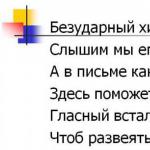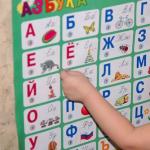Unstressed vowel sounds in roots. vowel sounds percussion and unstressed
Sounds are vowels and consonants. They help each other. Vowels connect consonants into syllables. Words are built from syllables, like bricks. In each word, one brick is the most important. This is a stressed syllable. If the stress is incorrectly placed, the word is difficult to understand.
Stressed and unstressed vowels
Stressed vowels - stressed vowels - are in strong position. Vowels without stress, they are called unstressed, - in weak position . Letters that represent sounds in weak positions are called orthograms. spelling - (from the Greek orthos - correct and gramma - letter) - spelling words according to some spelling rules.
Spelling - (from the Greek word: “orthos” - correct, and “grapho” - “write”) - the rules of written speech (i.e., spelling words). In Russian they say "spelling".
Pronunciation of unstressed vowels
Let's look at the words:
mushrooms, flowers- I hear And what to write? And or E?
water, grass- I hear A, what to write? A or O?
balls, rows- I hear an obscure sound And what to write? I? E? AND?
The conclusion is that in an unstressed position we do not hear a clear sound and we can make a mistake when writing.
In modern Russian, there is a law - in unstressed syllables, the sound O is not pronounced. Sound A works instead of it. And it will return to its place only when it becomes percussive. This is how sounds work. Compare : sea - seas, table - tables, elephant - elephants. Other vowel sounds behave in the same way: in unstressed syllables, each of them is replaced by some other.
In unstressed syllables, there is no vowel sound E. Say the word floors. It is not pronounced the way it is spelled. It is not difficult to notice that the sound U in words is not dangerous, it is well and clearly pronounced even in an unstressed position.
For competent writing, it is very important to learn how to identify unstressed vowels by ear without errors in order to anticipate the place in a word where you can make a mistake.
The squirrel was on a bitch. We hear unstressed sounds clearly and understand all the words.
Children play with a ball. It is not clear what children are playing with: a ball or a sword.
Checking an unstressed vowel
To understand written speech, it is important to learn how to write words without errors. There is a law in Russian: to check a weak position with a strong one.
Read the sentences and find clues in them.
Have a cat - k? tyata. Cat - Oh, so kittens are also Oh.
The tiger has gryata. Tiger - And, so the cubs are also I.
Here is an elephant. He has sl? nyata. Elephant - Oh, so baby elephants are also Oh.
Remember the rule: to check the spelling of a weak position, you need to change the word. How to do it?
1 step:Say the word being tested.
Does it have vowels in unstressed syllables?
If there is, what are they?
2 step:Choose a test word, change the word so that the sound being tested is under stress.
3 step:Write the vowel according to the sound you hear under the stress.
Step 4: Check what is written, read the word syllable by syllable.
Using a spelling dictionary
Worth taking advantage spelling dictionary , which can be used to check spelling.
You just need to know the secrets of the dictionary and memorize the alphabet well. Very often, short spelling dictionaries can be found at the end of Russian textbooks. If you don’t have a dictionary at hand, ask adults, the teacher, for spelling. Remember, the main thing is not to write with an error. It is better to leave room for the letter by marking it with a dot and enter the letter when there is no doubt at all.
Let's make a conclusion. The position of an unstressed vowel in a word is a danger that requires proof. Unstressed vowels cannot be trusted. Today in the lesson we learned how to check them in different ways: by a strong position, that is, by choosing a test word, and by using a dictionary if there is no test word. Remember this:
unstressed vowel sound
Causes a lot of pain.
For there to be no doubt
We put the sound under stress.
Or check with a spelling dictionary.
If you liked it, share it with your friends:
Join us atFacebook!
See also:
Preparation for exams in Russian:
Essentials from theory:
We offer online tests:
Only six are “a”, “o”, “y”, “i”, “e”, “s”. They are pronounced only with the participation of the voice, without the participation of noise. They can form syllables. They are percussion and non-percussion. Vowel sounds - stressed and unstressed - have their own characteristics and certain roles in the speech process. In addition, many norms for designating vowels in letters depend on the presence or absence of stress.
The vowels "e", "yu", "ya", "ё" are not separate sounds. They represent two sounds. For example: I - ya, yu - yu, etc. They are also endowed with additional functions - they indicate softness in writing.
stressed vowel sounds
Stress is called the voice allocated during pronunciation. That is, the one on which the emphasis falls. Such a sound is always pronounced more clearly. Compared to the unstressed one, it is in a stronger position and plays a semantic role. As a rule, writing letters that convey stressed vowels does not cause difficulties.
For example, in the words small (stress on the first syllable), peaceful (stress on the first syllable), distant (stress on the second syllable), the spelling of stressed syllables will not cause any doubts. Here the principle “as it is heard, so it is written” applies, and the sounds are heard clearly.
Stressed vowels are designed to perform the function of semantic distinction. For comparison: they say, small, soap, mule - words that we distinguish by ear due to the fact that different vowels are written in them.

Unstressed vowel sounds - what is it?
Unstressed are vowels that are not distinguished by a voice. They are pronounced with much less force and are nowhere near as energetic as percussive ones. They are in a weak position, and writing the letters that convey them is often difficult. The principle “as we hear, so we write” will not work in this case, since what is heard may not be what it really is.
An unstressed vowel is often in an altered state (a state of reduction). And the degree of transformation may depend on the distance of the stressed vowel. The further, the stronger the reduction. For example, in the word "kolobok" the last sound "o" is stressed - in the third syllable. The “o” closest to it (in the second syllable) is heard even more or less clearly, and the distant one (from the first syllable) is practically lost during pronunciation. Its duration in this case is minimal.

Relatively stable in this respect are the unstressed vowels “i”, “ы”, “у”. The degree of their transformation is almost not affected by the distance from the shock (mumiyo, Pinocchio, world). An exception can only be "and" at the beginning of a word after a solid consonant, which ends the previous word of the phrase. In such cases, "and" turns into "s". This situation is clearly visible, for example, in the phrase “smoke over the hut”.
Unstressed vowel sounds in roots. Spelling
As noted above, the transmission of unstressed vowels in writing often causes difficulties. It is especially problematic to understand which letter should designate an unstressed vowel sound at the root of a word.
The spelling of such roots is allocated to a special section of grammar and is studied in detail in philology. The choice of the correct letter depends on various factors: the characteristics of the neighborhood with other letters, the presence or absence of a stressed syllable nearby, their origin, etc.

Unchecked vowels in roots
The most difficult case in terms of spelling is unstressed vowels in unchecked words. When it is impossible to choose an option with a shock root.
The correct options in such situations can only be remembered or always carried with you a dictionary in which you can look up the spelling.
Words falling under this section include, for example: meridian, vinaigrette, concrete, corvalol, cheesecake and others. Many of them are of foreign origin.
Checked vowels in word roots
The letters denoting unstressed vowels in roots can in most cases be determined by choosing where the stress falls on the root.
For example, by changing the word "grass" to "grass", it is easy to understand which letter should be written in an unstressed root. More options: mountain - mountain, water - water, rain - rain, and so on and so forth. There are a great many examples in Russian.

Spelling of roots in words of different origin
Unstressed vowels in the main morphemes of words can have a different literal expression, depending on what origin this particular word has.
So, for example, primordially Russian words are often distinguished by the full-voiced spelling of the combinations -oro-, -olo-: young, fence, shell. And their Old Slavonic variants have an abbreviated version of the letter combination and the transformation of “o” into “a”: a baby, a fence, a cloud.
Alternating unstressed "a" and "o" in roots
Letters denoting unstressed vowels can alternate in roots. One of the alternation options is “a” and “o”. Different roots have their own spelling rules:
- For example, no matter which letter will be written under stress, in an unstressed position we almost always have the roots of “mountains”, “clone”, “creation”, “zar” and “melt”: caught fire, bow, create, illumined, fuse. But there are exceptions: burnouts, burnouts, utensils, dawn, swimmer, swimmer, quicksand, etc.
- The morphemes "rast", "rasch" and "ros" depend on the consonant closing the root. The letter "a" precedes "st" or "u", while "c" is usually preceded by "o". Do not fit into this rule: Rostislav, Rostov, usurer, sprout, sprout and variants derived from them (Rostov, usury, etc.), as well as the word branch.
- In the morphemes "skoch" and "skak" before the letter "h" is usually "o", and before "k" - "a". For example: horse, skipping rope, upstart, jump up. The only exceptions are the words jump, jump, jump and jump.
- Unstressed vowels in words with the roots "lag" and "lodge" are written in letters according to the following rule: "a" is used before "g", and "o" before "g". For example: compose, believe, decompose, addition, position, postpone. The exception is the canopy.
- The presence or absence of the suffix "a" is "guided" by such roots as "kas" and "kos". If the suffix is present immediately after the root, then it will be "kas", and if not, then it will be "kos". For example: touches, regarding, touched, touch.
- The spelling of roots with unstressed vowels sometimes depends on their meaning. So, in the case of “mok” (“urine”) and “poppy”, the first option “works” if we are talking about soaking in a liquid (blotter, wet), and the second - in the case when we mean immersion in a liquid (dip , dip).
- The morphemes "equal" and "even" are also "equal" to the meaning of the word. If the sameness is meant, then “a” (equal, equation) is written, and if straightness and smoothness, then “o” (smooth, align). Exceptions: coeval, plain, level, equally.

How "and" and "e" alternate
The letters of unstressed vowels "i" and "e" can also alternate in the roots of words.
The morphemes “bir” and “ber”, “zhig” and “burned”, “steel” and “steel”, “blist” and “glitter”, “world” and “mer”, “tir” and “ter”, “ dir" and "der", "fir" and "per", "chit" and "even" are directly dependent on the presence of the suffix "a". If it is next to the root, “and” is written, and if it is absent, “e”. Examples: to beg - will take away; cauterization - burned out; spreads - lay; brilliant - brilliant; freeze - freeze; wipe - wipe; tear off - tear off; unlock - unlock; read - deduction. Exceptions: couple, combination, combine.
Note:
- The roots "world" and "mer" can only alternate if they mean the process of dying. If we are talking about peace (the antonym of war), then at the root there will always be “and” (world, make peace). And if the morpheme means a measure, then “e” is always written (measure, measure).
- The roots "feast" and "per" alternate only if they mean the processes of opening, closing and sticking out (lock, unlock, push out). And if we are talking about the word “feast”, which means “feast of the stomach”, then at the root it will always be “and” (feast).

Alternation of the letter "a" ("I") with the letter combination "im" ("in") in the roots
The letter "a" ("I") alternates in the roots with the letter combination "im" ("in") in the roots of words according to the following rule: if there is a suffix "a" behind the root, then "im" or "in" is used. And if there is none, then it is written "a" or "I". For example: accept - accepted, start - started.
Vowel sounds - stressed and unstressed - are in every language of the world. And if, as a rule, there are no problems with drums, then unstressed ones create a lot of difficulties. Usually a huge number of spellings are associated with them. And the spelling of roots is only a small part of a big iceberg.
In Russian there are 10 vowels, 6 vowels. Vowels: a, i, e, e, o, u, s, e, u, i. Vowel sounds: [a], [o], [y], [e], [and], [s]. In the school curriculum, vowel sounds are indicated in the diagrams in red. In elementary grades, they explain: vowels are called so because they “voice”, they are pronounced “voiced”, while consonants got such a name because they “agree” with vowels.
Scheme 1. Vowels and vowel sounds of the Russian language.
Stressed and unstressed vowels
Vowel sounds are:
- drums: juice [o] - ice ['o], forest ['e] - mayor [e], drill [y] - hatch ['y],
- unstressed: in about yes [a], s at duck [y], l e juice [and].
Note. It is correct to say "stressed syllable" and "unstressed syllable". Instead of "stress falls on a vowel" say "stress falls on a syllable with a vowel." However, in the literature there are formulations "stressed vowel" and "unstressed vowel".
Stressed vowels are in a strong position, they are pronounced with more force and intonation. Unstressed vowels are in a weak position, they are pronounced with less force and may be subject to change.
Note. The designation of the letter e in a weak position differs in different school programs. Above, we showed the sound [and], in other school programs the designation [e] is found, in the institute program - [e and] (e with an overtone and).
In Russian, there are compound words with primary and secondary stress. In them, with a strong intonation, we highlight the main stress, with a weak intonation - a secondary one. For example, in the word foam blocks, the main stress falls on the syllable with the letter o, the secondary stress on the syllable with the letter e. In phonetic analysis, the vowel with the main stress is stressed, the vowel with the secondary stress is unstressed. For example: tricuspid, three-year-old.
Iotated vowel sounds
The letters i, u, e, e are called iotated and mean two sounds in the following positions of the word:
- at the beginning of the word: tree [th "olka], Yana [th" ana], raccoon [th" inot];
- after the vowel: hare [hare "its], button accordion [bai" an];
- after b or b: streams [ruch "y" and], rise [fall "om].
For ё and stressed vowels i, u, e, a replacement is made: i → [y'a], yu → [y'y], e → [y'e], yo → [y'o]. For unstressed vowels, a replacement is used: i → [th "and], e → [th" and]. In some school programs, when compiling a transcription of a word and during phonetic analysis, they write Latin j instead of th.
which are written in 10 letters:
1. The use of vowels as part of a word has some features in Russian:
Vowel [s] at the beginning of words, as a rule, does not appear; elementary [s] possible in rare borrowed proper nouns.
Yiya, Ynykgan.
Sound [s] used only after hard consonants.
Smoke[smoke], rear[rear].
Sound [and] used only after soft consonants.
Physicist[physicist].
Writing letters and after w, w, c (these sounds are always solid) is not determined by pronunciation: letter combinations zhi, shi, qi pronounced like [zhy], [shy], [tsy].
Vowel [s] pronounced in place of the letter and also at the beginning of the word after the preposition on a solid consonant (the preposition does not have its own stress and is adjacent to the next word).
From and rice- [from-s] rice.
Vowel [e] used in most cases after soft consonants.
Children[d'et'i], the weight[w'esʹ].
But there are digressions here. Sound [e] combined with hard consonants:
after [w], [w], [c];
Gesture[gesture] six[she't'], prices[prices].
in some foreign words;
Test[test], pace[tempo].
in some compound words.
HPP, VTEK.
2. A characteristic feature of Russian pronunciation is the different sound of vowels under stress and without stress.
The vowel in the stressed position is in strong position, that is, it is pronounced most clearly and with the greatest force. The unstressed vowel is in weak position, that is, it is pronounced with less force and less distinctly.
3. In an unstressed position (in a weak position), all vowel sounds are pronounced with less force, but some of them retain their qualitative characteristics, while others do not:
vowel sounds do not change the sound quality in an unstressed position [and], [s], [y](letters and, s, u, u );
Mil[m'il] - mila[m'ila], lived[live] - lived[lived], jester[joke] - (no) jester[joking].
Exception makes up the sound [and]: at the beginning of a word, if in the flow of speech the word merges with the previous word ending in a solid consonant, it sounds in place [s];
AT and exile[in s exile].
change the sound quality in unstressed vowels [a], [o], [e](letters a, i, o, e, e, e ).
4. Russian literary pronunciation is usually called "aka" and "hiccup".
In the prestressed syllable after hard consonants in place of vowels [a], [o], [e](in the position after solid this sound is rarely found in Russian) it usually sounds like a sound close to [a][a], although this sound is not so open, so in linguistics a special sign is used to denote it [Λ] .
Mabout th[moj] - mabout I[mΛja] or [maja], da l[gave] - da la[dΛla] or [gave].
In the prestressed syllable after soft consonants in place of vowels [a], [o], [e] sounds close to [and]. In the school version of transcription, it is usually denoted as [and], although this sound sounds more like [and] with an overtone [e] - [and uh ] .
Wed: vzI l[vz'al] - vzI la[vz’i e la] or [vz’ila], nyo With[nose] - ne sla[n'i e sla] or [n'isla], be l[b'el] - be la[b'i e la] or [b'ila].
It is with these features of Russian pronunciation that the need to check unstressed vowels with the help of related words in which this vowel is stressed, that is, in a strong position, is connected.
The position of the vowel in the first prestressed syllable is called I weak position: the force of exhalation when pronouncing the pre-stressed syllable is about one and a half times less than when pronouncing the stressed syllable.
Yandex.Direct
5. Exception can form some words with vowels [a], [o], [e] in I weak position after hissing [w], [w] and after the sound [c]:
after hard [w], [w], [c] before a soft consonant in place [a] a sound usually sounds in between [s] and [e](denoted [s uh ] );
ANDa fly[and s uh l'et'], losha dey[lush s uh d'ej], twentya ti[dvts s uh t'i].
in place of the letter e after [w], [w], [c] a sound is heard between [s] and [e], – [s uh ] ;
Wife[zhyena], sixth[shyestoj], price[tsyena].
after hard [w], [w] on the spot [a] sounds close to [a] – [Λ] , as after other solid consonants.
Wa R[ball] - sha ry[shΛry].
6. In other unstressed syllables (second, third prestressed syllables, stressed syllables) vowels [a], [o], [e] sound even weaker and more indistinct.
The position of the vowel in other unstressed syllables (not in the first pre-stressed) is usually called II weak position: the force of exhalation when pronouncing such syllables is three times less compared to a stressed syllable.
In the school course, these sounds are not specifically stipulated.
In linguistics, such sounds are usually called reduced, that is, “weakened”. For their designation, the signs are most often used: "er" [b]- after hard consonants, "er" [b] after soft consonants. (This resource uses a simplified version of the transcription of vowels, that is, the peculiarities of the pronunciation of vowels [o], [a], [e] in closed and open stressed syllables are not taken into account, the difference in pronunciation of [o], [a], [e] in stressed syllable, etc.)
For example:
after hard consonants: dabout movoy[d b mavoj], fisha [fish b], roofsa [roof b], ce face[ts b l’ikom];
after soft consonants: RI pre-war[R' b davoj], floore [floor' b], ha owl worker[h' b sΛfsch'ik].
7. Exception constitutes II weak position of vowels in the absolute beginning of a word [a], [o]. In place of these vowels at the beginning of the word, an unreduced "er" sounds [b], and a sound close to [a] – [Λ] , as in I weak position after hard consonants.
O cucumber[Λgur'etz]; about bezyan[Λb'iez'janʹ].
Repetition
To remember the topics already covered in the Russian language, we will solve a crossword puzzle. To do this, we will write down the words vertically in empty cells, guessing them by meaning.
Rice. 1. Crossword
- I hear sounds, but will I hear letters?
- Highlighting a syllable in a word by the power of the voice or by raising the tone.
- The sounds that form a syllable.
- Icons for recording sounds.
- We write and read letters, but we pronounce and hear ...?
- The smallest pronunciation unit.
- A collection of words arranged in alphabetical order, with explanations, references, interpretations, translation into other languages.
Let's check ourselves.

Rice. 2. Completed crossword with a code word
In the selected cells horizontally, we got the word RULE.
Again, speech is made up of sounds. Sounds are vowels and consonants. They help each other. Vowels connect consonants into syllables. Words are built from syllables, like bricks. In each word, one brick is the most important. This is a stressed syllable. If the stress is incorrectly placed, the word is difficult to understand.
Stressed and unstressed vowels
Let's complete the task: look at the photo and name what is shown on them.

Rice. 3()


Flowers, pine, balls. Let's put the stress in the words and show the vowels that ended up in an unstressed position, emphasizing them. Flowers you, from sleep, ball chi. Let's read these words not by syllables, but quickly. It is noticeable that unstressed vowels were pronounced less distinctly.
Stressed vowels - stressed vowels - are in strong position. Vowels without stress, they are called unstressed, - in weak position . Letters that represent sounds in weak positions are called orthograms. spelling - (from the Greek orthos - correct and gramma - letter) - spelling words according to some spelling rules.
Spelling - (from the Greek word: “orthos” - correct, and “grapho” - “write”) - the rules of written speech (i.e., spelling words). In Russian they say "spelling".
Pronunciation of unstressed vowels
Let's look at the words:
mushrooms, flowers- I hear And what to write? And or E?
water, grass- I hear A, what to write? A or O?
balls, rows- I hear an obscure sound And what to write? I? E? AND?
The conclusion is that in an unstressed position we do not hear a clear sound and we can make a mistake when writing.
In modern Russian, there is a law - in unstressed syllables, the sound O is not pronounced. Sound A works instead of it. And it will return to its place only when it becomes percussive. This is how sounds work. Compare : sea - seas, table - tables, elephant - elephants. Other vowel sounds behave in the same way: in unstressed syllables, each of them is replaced by some other.
In unstressed syllables, there is no vowel sound E. Say the word floors. It is not pronounced the way it is spelled. It is not difficult to notice that the sound U in words is not dangerous, it is well and clearly pronounced even in an unstressed position.
For competent writing, it is very important to learn how to identify unstressed vowels by ear without errors in order to anticipate the place in a word where you can make a mistake. Sometimes they say - to find an erroneously dangerous place in a word. Let's write down the suggestions.
The squirrel was on a bitch. We hear unstressed sounds clearly and understand all the words.
Children play with a ball. It is not clear what children are playing with: a ball or a sword.
Checking an unstressed vowel
To understand written speech, it is important to learn how to write words without errors. There is a law in Russian: to check a weak position with a strong one.
Read the sentences and find clues in them.
Have a cat - k? tyata. Cat - Oh, so kittens are also Oh.
The tiger has gryata. Tiger - And, so the cubs are also I.
Here is an elephant. He has sl? nyata. Elephant - Oh, so baby elephants are also Oh.
Remember the rule: to check the spelling of a weak position, you need to change the word. How to do it?
Step 1: Say the word being tested.
Does it have vowels in unstressed syllables?
If there is, what are they?
Step 2: Choose a test word, change the word so that the sound being tested is under stress.
Step 3: Write the vowel according to the sound you hear under stress.
Step 4: Check what is written, read the word syllable by syllable.
Now we are going to the zoo. All animals are listed here so visitors know who they are considering. Here are different birds. Let's sign their names.

it owl. Percussive sound A. How to write without error - owl or sava ? How will we act? Let's pick a test word, change the word owl on the With about you, Now stressed Oh, so let's write owl. We proceed in the same way.



Rice. 11. Crane ()

Crossbills? Thrushes? Cranes? Rooks?
How to deal with words sparrow, nightingale, crow, magpie?




Using a spelling dictionary
Worth taking advantage spelling dictionary , which can be used to check spelling.

Rice. 17. Spelling dictionary ()
You just need to know the secrets of the dictionary and memorize the alphabet well. Very often, short spelling dictionaries can be found at the end of Russian textbooks. If you don’t have a dictionary at hand, ask adults, the teacher, for spelling. Remember, the main thing is not to write with an error. It is better to leave room for the letter by marking it with a dot and enter the letter when there is no doubt at all.
Let's make a conclusion. The position of an unstressed vowel in a word is a danger that requires proof. Unstressed vowels cannot be trusted. Today in the lesson we learned how to check them in different ways: by a strong position, that is, by choosing a test word, and by using a dictionary if there is no test word. Remember this:
unstressed vowel sound
Causes a lot of pain.
For there to be no doubt
We put the sound under stress. Or check with a spelling dictionary.).
- Andrianova T.M., Ilyukhina V.A. Russian language 1. M .: Astrel, 2011. Pp. 26, ex. 2; Page 28, ex. 3.
- Arrange a word. What letter will you put in? Fur hat - what kind of hat? (m.hovaya- E). Here is a garden, what kind of strawberries grow there? ( garden- BUT). Here is the forest, what kind of strawberries are there? ( forest- E).
- Read the words with unstressed vowels. Pick up test words, name the vowel: word, star, back, sh.ry, b.ly, central kidney. (sl.va - word- Oh, the stars are the stars- E, sh.ry - ball- Ah, b.ly - pain- Oh, c.kidney - chain- E.)
- * Using the knowledge gained in the lesson, make 5 sentences with missing unstressed vowels in words, explain the spelling.





